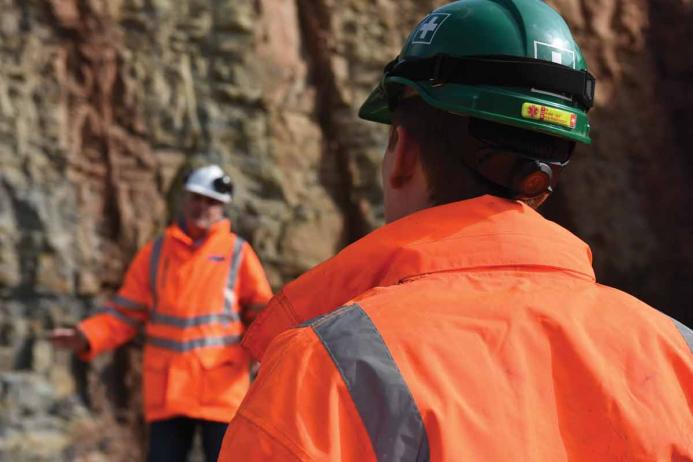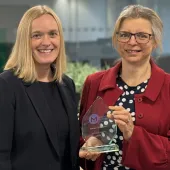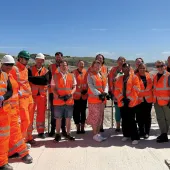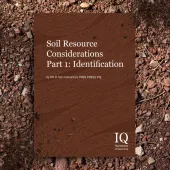Believe in Lifelong Learning

First published in the March 2024 issue of Quarry Management
Skills for Life, the rallying call from last month’s National Apprenticeship Week, helped to define some of the entry points into our industry for young people as well as celebrating those who are successfully working through their apprenticeship journey. Apprenticeships are, without doubt, invaluable to our sector, but in terms of a lifelong career pathway, they are often only the first steps of a longer, evolving journey.
What is evident is that a great deal of thought, structure, and results-driven focus is given to apprenticeships. Consideration is given to both on-site and off-site learning to supply the knowledge needed to effectively work on site.
In addition, the sector benefits from specialist higher education training. The Institute of Quarrying’s compelling partnership with the University of Derby Centre for Mineral Products delivers a successful higher apprenticeships programme, with 70% of students graduating with a distinction and 68% going on to study Minerals Management at honours degree level. Furthermore, foundation degrees and university diplomas in Mineral Extractives Technology, Asphalt Technology, Concrete, Cement and Clay Technologies are also on offer.
There is also a drive from six organizations – The Mineral Products Qualifications Council, The Institute of Quarrying (IQ), Institute of Materials, Minerals and Mining, Critical Minerals Association UK, Mineral Products Association, and MAUK – The Mining Association of the UK – who jointly penned an open letter to UK university leaders emphasizing the crucial role of materials, minerals, and mining in modern society and the transition to a low-carbon, resilient, and resource-efficient society. The letter stresses the need for a high-quality education and training pipeline to support a skilled, responsible, and sustainable workforce in response to the rising global demand for resources.[1]
Skills questions to consider
Other hard questions, therefore, arise once the apprenticeship, degree, or diploma is over, such as:
Do we continue to invest in our people, not just for the odd day or week course, but as a continuous drive to professional development?
Are we aligning the business-critical needs to training people towards those goals and developing skilled individuals as part of that process?
Are we keeping people safe by giving them access to health and safety issues and new legislation that could affect their roles? It is worth noting the good work recently done by the Quarries National Joint Advisory Committee (QNJAC) and their Safety Guidance, available online at qnjac.co.uk
Are we on course to adopt and understand the digital opportunities that Industry 4.0 demands for business and supply chain agility?
Or is the reality that, once people leave the Centre of Excellence for Mineral Products or complete their end-point assessments, they are too often left to fend for themselves in the business, whilst our attention and resources favour the new intakes of apprentices and undergraduates?
Then, does continuous professional development, by default, transfer the responsibility of upskilling and training to the individuals in the workforce, where those achieving minimum hours per year, tick the box and are used to benchmark the training success of companies?
Skills for life, therefore, must mean a broader mantra than investing in early years and letting daily experiences be the sole mentor from the post-education setting.
For an effective, motivated, and productive workforce, training and development budgets need to be an immovable on-cost which is essential to maintain and evolve. Investment is at least as critical as operational plant and machinery.
Clear reasons to back lifelong learning
Back in 2017 the Government Office for Science stated ‘Skills are intrinsically linked with economic growth, productivity improvement, competitiveness, and innovation’.[2]
Technological progress, including automation, is another major driver of productivity, growth, and prosperity, but one which frequently requires transitions that can disrupt the workforce.[2]
Regional economic fluctuations are disruptive to the labour market. This can result in short- or longer-term skills mismatches in local labour forces. This has the dual effect of increasing the requirement for training, as people adapt to new roles and even new sectors, and reducing the incentive for employers to invest in training their staff if they are less likely to stay in that company or sector for prolonged periods of time.
According to the Chartered Institute of Personnel and Development, over the past decade UK businesses have consistently underinvested in training employees in comparison with other European countries.[3]

Employees value clear pathways
Supported and clear career pathways for employees are valued by the workforce, and there are simple steps that can be used to ensure they happen:
A company structure that understands what skills are needed.
Mapped responsibilities and requirements for each of the key positions.
Showing the workforce the roadmap to advancement in their careers.
Using third-party expertise to retain people and train them on some of the things they place value on.
Make training intrinsic to the culture.
Every employee should know their career pathway. This process begins with onboarding and continues throughout the employment life cycle.
IQ and MPQC – continuous career progression for individuals and business
Anyone associated with the quarrying, mineral extractives, and processing sectors, at any stage of their career, can reap the benefits of IQ and MPQC membership, whether working directly in a quarry or as a supplier to the industry.
The Institute of Quarrying has been supporting the industry with recognized industry-specific qualifications since 1949. Its approach to education and training has been to work with operators to develop knowledge-based courses to meet a specific need. IQ has long had the capability to deliver online learning so its courses can be tailored and delivered in a flexible way to suit the business and the individual learner.
The graded membership at IQ provides clear progression as an individual’s career develops. As a member’s work experience, knowledge, skills, and career evolve, so does their membership.
James Thorne, joint chief executive officer of IQ and MPQC, said: ‘Like many professional organizations, our members are required to actively engage in and record their continuing professional development (CPD). From participating in webinars, branch technical events, attending conferences, or completing a qualification, all CPD opportunities that are available are tailored to fit in with members’ busy working lives.
‘The qualifications available to our members enable a clear progression path to those employed in the sector, both nationally and internationally, who wish to enhance their career and lifelong learning opportunities. Each event and qualification is developed and regularly modified for today’s workplace, to ensure that members’ skills and competences remain relevant now and in the future.’
IQ Connect
IQ members can access a sample of this learning through the ‘IQ Connect’ app. IQ Connect brings together valuable resources and learning materials as part of membership.
L3 SHE Knowledge Certificate (VQ)
The Level 3 Certificate in Safety, Health and Environmental Knowledge for the Extractives and Mineral Processing Industries has been developed to provide an in-depth understanding of essential elements required for an individual’s career development in the extractives and mineral processing industries.
The 12-month course delivers a firm foundation of knowledge in key elements of safety, health, and environmental processes and procedures, alongside additional complementary key areas such as leadership and communication techniques and theory.
Ideally suited for supervisors, foremen, or anyone aspiring to join supervisory management, along with those who may have been out of education for some time, the course is delivered through online modules and assessments. Feedback is provided from the tutor after each completed unit. There are three supporting tutorials, which are currently being delivered online but are usually face to face and occur locally to the learner.
Learners also have an annual IQ membership included with the course so they can extend their learning through local branch networks and access additional valuable content.
Geotechnical Qualifications
In addition to its extensive range of courses available for industry professionals, IQ offers the following courses designed for those in geotechnical roles:
Level 2 Geotechnical Awareness
Ideal for any person exposed to potential geotechnical hazards in a quarry or depot environment, the course provides an overview of geotechnical theory, reasons for site rules and how to apply them, as well as the opportunity to undertake a basic quarry face inspection. The course is delivered as a face-to-face one-day tutorial at the learner’s site.
Level 3 Award in Geotechnical Knowledge for Managing Mineral Processing Operations
In partnership with MP Awards, IQ offers a geotechnical qualification which is pathway-driven, focused on the specific needs of supervisors, foremen, and those aspiring to be in management positions within an extractives environment. The qualification outlines best practices, identification of hazards, inspection schemes, and design considerations for new quarries or site developments. The course duration is up to three months and incorporates a face-to-face tutorial, tailored online learning, and an end-point assessment.
Level 4 Award in Geotechnical Knowledge for Managing Mineral Processing Operations
This qualification is suited to the specific needs of responsible managers, senior managers, and quarry managers within an extractive environment and provides an overview of excavation and tip rules, design and inspections, lagoon stability and safe means of disposing of waste. The course runs over three months featuring a face-to-face tutorial, flexible online learning, and an end-point assessment in the form of a professional discussion.
Longer working lives
The UK has an ageing population, and with predicted changes to the pension age, the result will be longer working lives.
The connection and greater need for lifelong learning is obvious and is why building on the intensity of skills learned during the education system, via methodical and consistent learning throughout a career, is essential to create a workforce that is agile and equipped to weather market and technological change.
With the extractive industry facing significant growth as the push for Net Zero accelerates, acquiring new skills, supported by consistent investment in training, is the pathway to productive employment for those affected, helping to create an inclusive economy.
For further information on IQ short courses and IQ and MPQC training opportunities, visit www.quarrying.org and www.mpskills.co.uk
References
assets.publishing.service.gov.uk/media/
5b51fbdae5274a3fd124c916/Foresight-future-of-skills-lifelong-learning_V8.pdfAddressing employer underinvestment in training; published by Chartered Institute of Personnel and Development (2019)
Subscribe to Quarry Management, the monthly journal for the mineral products industry, to read articles before they appear on Agg-Net.com








